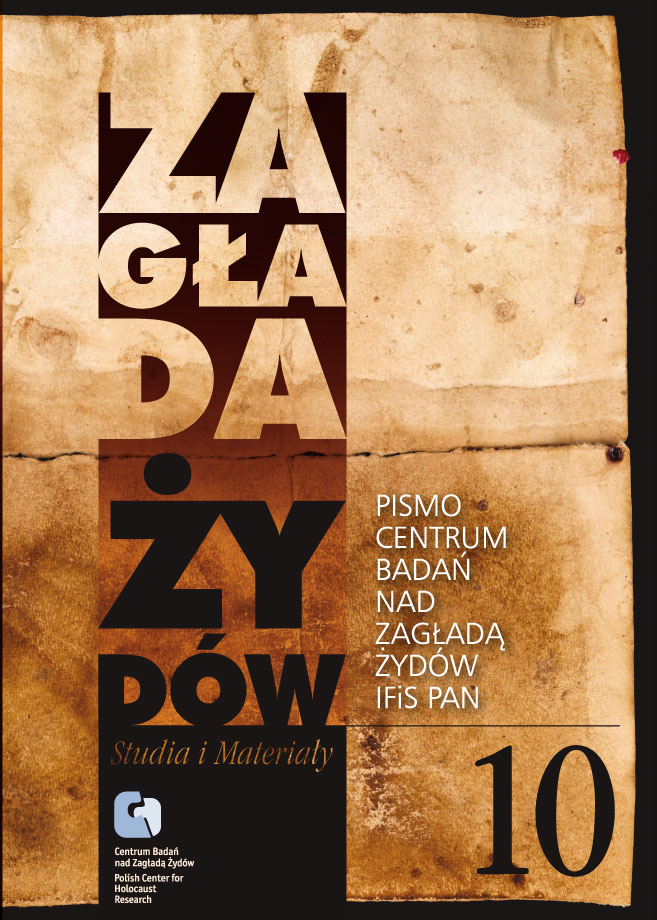Will the Truth Set Us Free?. Breaking the resistance in the education about Holocaust
Zagłada Żydów. Studia i Materiały, No. 10 (2014), Pages: 803-822
Submission Date: 2020-10-26Publication Date: 2014-12-01
 https://doi.org/10.32927/ZZSiM.549
https://doi.org/10.32927/ZZSiM.549
Abstract
The introduction of the programs on Holocaust education in Poland and a broader debate on the transgressions of Poles against the Jews have not led to desired improvement in public knowledge on these historical events. A comparison of survey results from the last two decades (Bilewicz, Winiewski, Radzik, 2012) illustrates mounting ignorance: the number of Poles who acknowledge that the highest number of victims of the Nazi occupation period was Jewish systematically decreases, while the number of those who think that the highest number of victims of the wartime period was ethnically Polish, increases. Insights from the social psychological research allow to explain the psychological foundations of this resistance to acknowledge the facts about the Holocaust, and indicate the need for positive group identity as a crucial factor preventing people from recognizing such a threatening historical information. In this paper we will provide knowledge about the ways to overcome this resistance-through-denial. Implementation of such measures could allow people to accept responsibility for the misdeeds committed by their ancestors.
License
Copyright (c) 2014 Author&"Holocaust Studies and Materials"

This work is licensed under a Creative Commons Attribution 4.0 International License.
https://creativecommons.org/licenses/by/4.0
The journal is published under the Diamond Open Access Standard, CC-BY-4.0 Deed - Attribution 4.0 International - Creative Commons
Most read articles by the same author(s)
- Michał Bilewicz, Not only about “Fear”. The psychology of the common understanding of history , Zagłada Żydów. Studia i Materiały: No. 4 (2008)
- Michał Bilewicz, Karolina Marcinkowska, The social psychology of the Holocaust: from naive situationism to understanding the role of ideology , Zagłada Żydów. Studia i Materiały: No. 20 (2024)
Similar Articles
- Nawojka Cieślińska-Lobkowicz, Traces of Unknown Pre-war Jewish Collectors and Owners of Works of Art , Zagłada Żydów. Studia i Materiały: No. 17 (2021)
- Marta Duch-Dyngosz, In Search of Local Memory of the Holocaust. The Case of Commemoration of Jewish Communities in Smaller Towns in Contemporary Poland , Zagłada Żydów. Studia i Materiały: No. 17 (2021)
- Michał Bilewicz, Not only about “Fear”. The psychology of the common understanding of history , Zagłada Żydów. Studia i Materiały: No. 4 (2008)
- Aleksandra Bańkowska, Between responsibility and powerlessness, generosity and temptation. Social care workers in the Warsaw ghetto in the face of their charges and petitioners , Zagłada Żydów. Studia i Materiały: No. 20 (2024)
- Mordechay Giloh, Distinct Profiles and Characteristics of Jewish and non-Jewish Concentration Camp Survivors in Sweden , Zagłada Żydów. Studia i Materiały: No. 8 (2012)
- Piotr Forecki, Anna Zawadzka, The Golden Mean Principle. A Handful of Comments on the Currently Dominant Discourse on ‘Polish-Jewish Relations’ , Zagłada Żydów. Studia i Materiały: No. Holocaust Studies and Materials (2017)
- Victoria Van Orden Martínez, Emotions as testimony: Documenting the psychological aspects of witnessing in an early survivor historical commission , Zagłada Żydów. Studia i Materiały: No. 20 (2024)
- Agnieszka Kajczyk, Iwona Kurz, “Typical Image”: The album Extermination of Polish Jewry (1945) , Zagłada Żydów. Studia i Materiały: No. 20 (2024)
- Anna Zawadzka, Piotr Forecki, The Golden Mean Principle. A handful of comments on the currently dominant discourse about ‘Polish-Jewish relations , Zagłada Żydów. Studia i Materiały: No. 11 (2015)
- Ewa Koźmińska-Frejlak, “I’m going to the oven because I didn’t want to give myself up.” Records of the Social Court of the Central Jewish in Poland. An attempt at a gender reading , Zagłada Żydów. Studia i Materiały: No. 19 (2023)
<< < 1 2 3 4 5 6 7 8 9 10 11 12 13 14 15 16 17 18 19 20 21 22 23 24 25 26 27 28 29 30 31 32 33 34 35 36 37 38 39 40 41 42 43 44 45 46 47 48 49 50 > >>
You may also start an advanced similarity search for this article.
 English
English
 Język Polski
Język Polski



 https://orcid.org/0000-0001-5027-1691
https://orcid.org/0000-0001-5027-1691





